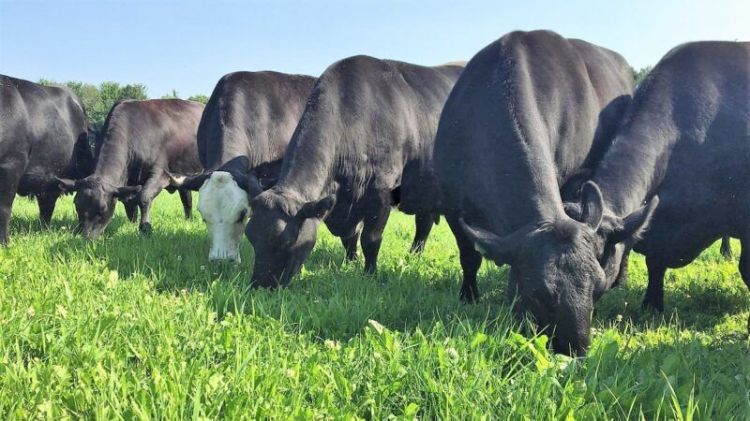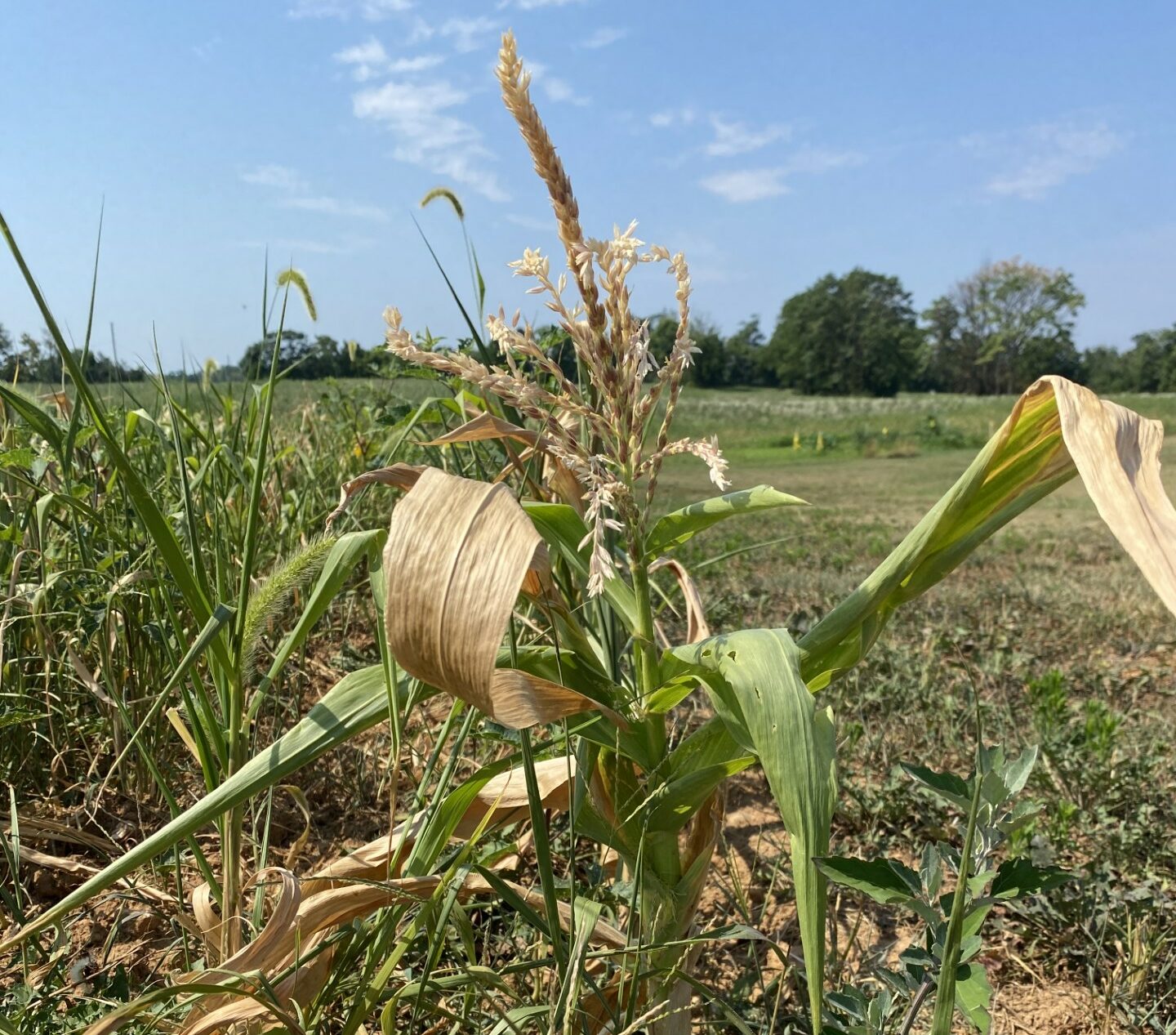
Just as the pandemic was taking off, Caldwell Family Farm in Turner lost a large beef customer. Workers thought the farm might go out of business. Instead, local demand made up the difference. Photo courtesy of Caldwell Family Farm
John Carter’s family has been farming in Bethel since 1791. His business, Middle Intervale Farm, brings roughly 200 head of livestock to market every year, and sells beef, lamb, eggs and produce throughout Maine.
During the pandemic, as large processing plants closed, demand for the farm’s beef went up – but the availability of spots at the local slaughterhouse went down.
“I definitely got cut back,” Carter said, meaning he had to keep animals, and pay to feed them, for a longer period. “I got stuck with 30 to 40 hogs. That sucked.”
While demand for local meat is rising in Maine, some livestock producers are finding it hard to get animals processed in a timely manner.
The slaughterhouse backlog began in 2020. As large meatpackers across the nation temporarily shut down or reduced their intake, smaller processors took up some of the slack.
Labor shortages, supply chain disruptions and an increased demand for local meat meant many livestock producers had to wait several months to process animals.
The pandemic changed the landscape for both producers and processors, said Jennifer Eberly, the director of Maine’s meat and poultry inspection program, noting that most of the state’s slaughterhouses saw a marked increase in requests for slaughter and processing.
Before the pandemic, Maine’s state-inspected slaughterhouses produced under a million pounds of dressed weight red meat per year. In 2022 and 2023, that figure jumped to around 1.5 million.
And the new demand isn’t going away soon.
“I believe the panic over not being able to get meat during the pandemic has increased the visibility of these small local facilities,” Eberly said, noting that such facilities were able to continue providing meat when grocery stores and large distributors could not.
“Although those initial wild months of working nonstop at slaughterhouses have passed, most slaughterhouses are still doing more business than they did pre-pandemic,” she said.
Josh Burrill has a herd of Highland cattle in Palmyra. Though he characterizes himself as a “go-with-the-flow” farmer, he said there were “choke points” that added costs and made things difficult during the pandemic. He remembered one slaughterhouse that had a six-month waitlist.
“They had a 100-pig backup,” he said, noting that keeping a pig for an extra six months would be financially disastrous.
Percy Lorette, an experienced farmer and butcher, is in the process of creating a slaughterhouse in the central Maine town of Athens called Cold Creek Processing, which will specialize in sausage and smoked meats.
In the first year, Lorette plans on being a custom-exempt plant, meaning the meat can be consumed by the owner but not sold. The following year, he hopes to turn Cold Creek into a state-inspected facility, which means its products could be sold to co-ops, restaurants and at farmer’s markets.
He plans to hire several employees, with the goal of processing 1,500 to 2,000 animals per year. Comprising 2,400 square feet, Cold Creek Processing will serve the small farmers that dominate Maine’s beef industry – farmers who market 10 to 15 beef animals per year.
“I know there’s a definite need for it,” Lorette said. “For many farmers, they’re looking at six months to a year to get appointments.”
In the last two years, state and federal agencies have poured more than a million dollars into improving Maine’s livestock processing infrastructure. Just last week, Rep. Chellie Pingree announced a nearly $250,000 federal grant to expand meat processing operations at Short Creek Meats in Kennebunk.
“Supporting local food not only benefits small-scale producers and processors, it is also good for the health of our communities and for our environment,” Pingree said in a statement. “This investment will expand Short Creek Meats’ processing power, reducing costs and boosting production to deliver high quality, locally grown food for consumers in Maine and across New England.”
Christian Jensen’s operation in Pittston, called Morton Brook Ranch, is among Maine’s smaller livestock producers. He started his farm during the pandemic and usually has eight bovines, 240 chickens and roughly 40 sheep processed each year.
Jensen said demand for his meat was “quite high” during the pandemic, and there were a few times when he had difficulty finding a spot at a slaughterhouse.
“They were booked out,” he said.
Because of the small size of his operation, Jensen was able to make other arrangements. Still, he said he had to travel farther than was ideal, and hold on to animals longer than he wanted.
Most slaughterhouses are in southern and central Maine. This means farmers in places like Aroostook County have to drive for hours to get to a processor.
Hatch’s Custom Meat Cutting in Crystal recently became a state-inspected facility to help address that issue. Rooney’s Meat Shop in Mapleton is also upgrading to become a state-inspected slaughterhouse.
Not everyone thinks there’s a problem with access to slaughterhouses.
“I don’t think there is any bottleneck in the industry,” said Gabe Clark of Cold Spring Ranch in New Portland.
While many farmers slaughter animals in the fall after months on pasture, Clark takes a different approach, using high-quality hay to keep livestock fed during the winter.
“We butcher every single week of the year,” he said, noting this helps even out the workload for the slaughterhouses. “Processors need to make a living year-round, too.”
Caldwell Family Farm in Turner is one of the larger family-owned beef operations in Maine. The farm generally runs around 500 head of cattle and sends somewhere between three and nine animals to be processed every week.
Just as the pandemic was taking off, Caldwell Family Farm lost a large beef customer and thought the farm might go out of business. Instead, local demand made up the difference.
One advantage of being a relatively large producer is it allows the farmer to establish a consistent, predictable relationship with a slaughterhouse, Deedee Caldwell said.
“He never says no,” Caldwell said of Luce’s Maine Grown Meats, the slaughterhouse she uses. Caldwell Family Farm has its animals slaughtered at Luce’s and processes the meat at its own USDA-inspected facility.
Jayson Buzzell of JB Meats in Greene knows meat processing inside and out. His grandparents started the operation in the 1970s, and he took over during the pandemic.
“I’ve worked here my entire life,” he said.
Business has been steady, he said, with customers coming from as far as Massachusetts. The fall, when most farmers want to have animals processed and avoid feeding for another winter, is his busiest season.
Still, Buzzell said he can usually squeeze an emergency customer in by spending an extra day slaughtering. He normally slaughters two days a week and processes animals for the rest of the week.
Buzzell has considered applying for grants but in the end has always decided against it.
“If I can do this with just my hard work and dedication, that’s what I’ll do,” he said. “That’s who I am.”
This story was originally published by The Maine Monitor, a nonprofit and nonpartisan news organization. To get regular coverage from the Monitor, sign up for a free Monitor newsletter here.
« Previous
Related Stories































Invalid username/password.
Please check your email to confirm and complete your registration.
Use the form below to reset your password. When you’ve submitted your account email, we will send an email with a reset code.